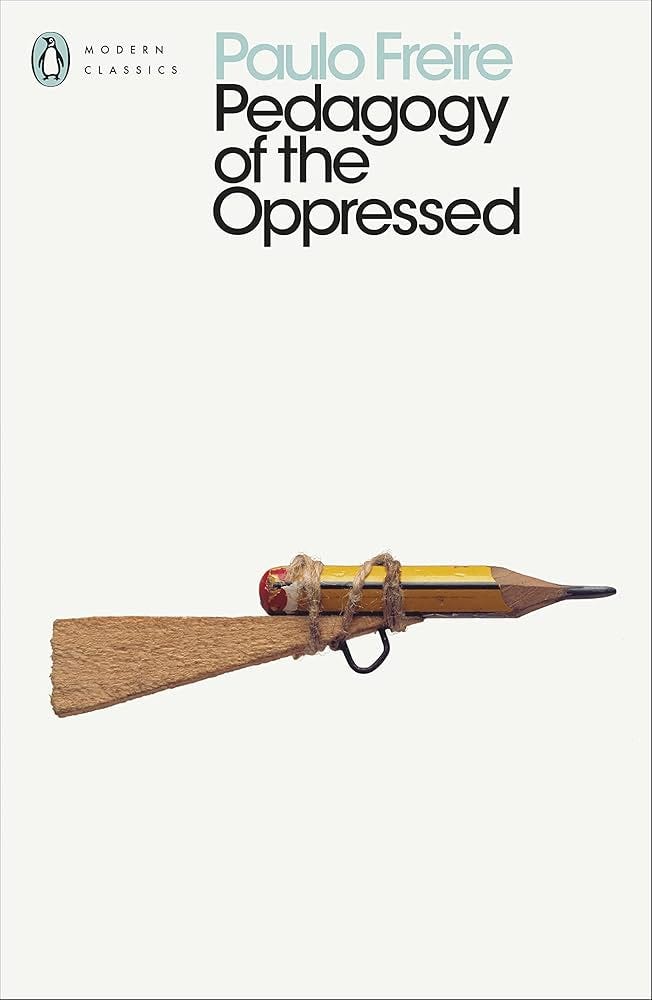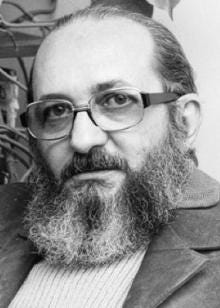What's the point of citing Freire?
Pedagogy of the Oppressed and the narratives we'd rather ignore
I recently read, for the first time, Pedagogy of the Oppressed by Paulo Freire. It’s one of those books that gets cited so often in education studies, you half feel as if you’ve read it without reading it. I finally followed through on reading it for myself.
The book was first published in 1968 and has gone on to be a key touchstone in the social sciences. Freire wrote in as a result of years doing alternative literacy education in Chile, following his political exile by Brazil’s military government.
For him, education was either a political act or it wasn’t education. I’d like to think about just what he was trying to say and whether there’s anything to learn from it.

Telling ourselves half the story
If there’s one thing above all others that people cite this book for, it’s Freire’s “banking model of education.” He describes how education often looks like a teacher believing themselves to hold knowledge and believing their job to be depositing that knowledge in the heads of their students. In this arrangement, teaching is a one-way process in which the teacher speaks and the student recalls.
I think we’ve all experienced this kind of education because it’s largely the default. When you take a multiple choice test, it’s because someone expects you to reproduce knowledge which has, ostensibly, been deposited in your head. If you do a good job of banking it, you’re a good student. If not, you’re not.
This approach eliminates student agency. Instead of being the drivers of their education, they are merely the objects of an educative process. This creates a sense of helplessness for the student where they conceive of themselves as “ones without knowledge” and teachers as “ones with knowledge.” This passivity can inspire a range of responses like resentment or disinterest.
It does not tend to inspire curiosity.
Freire contends that curiosity is the cornerstone of valid education. Curiosity can only take root when students have ownership over their own education. They must be co-creators of learning. Freire goes on to contend that “banking” education is a tool of oppression because an oppressive state will be afraid of people asking their own questions. It will only allow some kind of things to be taught and will discourage curiosity since curiosity might lead to people questioning the state’s oppressive practices.
Educators, then, can read Freire’s text and conclude that by lecturing less and allowing more student-directed learning practices, they are in fact fighting oppression. It is, after all, more pleasant to think of yourself as being an agent of liberation than as an agent of oppression.
The citations often stop there, but Freire doesn’t.
What education is and isn’t
It’s easy to take on the lesson “lecturing is bad, actually” and go on with your day. But Freire continues so say “school is bad, actually, too.”
The issue with schools is that they are typically recognized by the state. Freire views most governments as definitionally oppressive because they maintain the separation of social classes and allow the economic minority to rule the majority population. This isn’t really a question as, for him, it’s obvious. He dreams that a revolutionary government could change social and government relations, but examples are rare.
Schools, according to Freire, exist with the approval of an oppressive state because they are instruments of oppression. The school functions to reinforce the authority of the state and to circumscribe the kinds of questions which students are allowed to ask. Because schools determine their curriculum and impose that curriculum on students without their input, they oppress. Freire notes that most teachers are well-meaning, but their willingness to participate in government-sanctioned education makes them well-meaning tools of oppression. Even if your government is very progressive and inclusive, it acts as an oppressor when it imposes its well-intentioned ideas on people without their input.
So, if every school that exists with government permission is oppressive, the way toward non-oppressive education is in education which is not recognized by the government.
For Freire, authentic education happens outside of institutions. People with different experiences come together and ask each other what they want to know about their situation. Instead of education being the product of a planned curriculum, education is the product of a commitment to a community. That community will determine where their inquiry leads, but it can’t be planned in advance.
It’s worth noting here that Freire is pretty sure that if you have authentic education take place, it will lead to a critical consciousness in its participants who will then form the basis of a revolutionary movement. While no political vision can be imposed by a teacher, he contends that any oppressed learner given free reign to examine their circumstances is likely to adopt a revolutionary perspective.
Are we the baddies?
All of this puts educators in an awkward position. We are, by definition, working against liberation because we’re working in schools. So why do we keep citing this book?
I think there’s some selective reading going on. The reason this book is popular is not for its specific claims. If we extrapolate what Freire says about education, we can simplify it to something like “Education has the power to oppress or liberate. The way that you work with students can transform their lives and empower them to change society.”
Much like how the banking model is cited, this idea works best if we stop reading partway through. It might be, however, that no one is actually reading Freire anyway. Maybe we are just reading select quotations or citing other people’s citations, thereby reinforcing a narrative about him that he would not use in his own work.
No citation can effectively summarize the entirety of a work. The fact is that when people reference Freire, they are almost entirely referencing select passages from the second chapter of this book. That’s the material that today’s readers can extract and apply to their situation, giving credibility to claims of “critical pedagogy” without having to get too into the weeds.
Liberating education
Pedagogy of the Oppressed is a book about theory. It has theories about education, but mostly these are nested within theories about social change more broadly conceived. As I’ve said, we ignore most of what the book has to say.
Since we’re in the habit of only applying Freire piecemeal, I’d like to finish by doing exactly that with one element of his book that seems to get less attention.
Freire says that education does not happen in schools because state-approved schools can only be instruments which reinforce oppression. Therefore, authentic education has to happen outside the education system.
Let’s extrapolate this and say that a Freirean claim could be “The thing which happens in schools is not education.” Even if you think education is happening in schools, the claim makes you ask “What else are schools doing?”
Now, of course schools aren’t just educating. They also train students in social mores. They reinforce narratives about what kind of knowledge has value. They provide credentialing which allows their graduates access to different economic classes. They do many things which could not simply be described as “free inquiry.”
Freire’s claim would be that these “supplemental” ends which schools pursue are, in fact, their only ends. Any system which exists for a purpose other than free inquiry is not and cannot be “education.” It may be an environment in which student learn things, but the limitations on their inquiry mean that the learning happening there is oppressive by nature.
Okay, so we don’t have to agree with all of that. But I do think the thought leads to an interesting exercise.
When have you experienced an education outside of school?
For example, I am in a book club. In that book club, I recently read The Book of Lights by Chaim Potok. Nobody made me do this. No one is going to grade me on how well I read it. When I finish it, it will not open up any other economic prospects for me. The government has no interest in my reading it (aside from the fact that I checked it out from a library, I guess).
I will meet with my book club to discuss this book, learn more about how other people read it, and share in the social joy of mutual literacy. That is the end of my education.
Is this a more liberatory experience than attending school? If I were taking a college seminar on Chaim Potok, would that be less “educative” than my book club? Freire allows me to ask that question.
I think this approach can give dignity to the kinds of education we choose for ourselves, to earnestly call these efforts “education” instead of just “hobbies.” It can also allow us to think more critically about what schools provide to our students; the “education” may be dependent on several other “non-education” practices and obligations.
Take what you want
This final approach to Freire is simply reinforcing what I complained about earlier. I, like many who cite him, am trying to hold on to some nuggets that inspire me without having to adopt his entire worldview.
It’s easy for me to critique people for aligning themselves with Freire while pointedly avoiding the stated purpose of his work. But don’t we do that with almost every book? Any great book has more to say than we can process or understand. All of them have layers of meaning, big ideas resting on other big ideas.
The point of great books is to revisit them. On one reading, they provide one idea. On further readings, there’s more to learn. Great books are deep wells, bringing up fresh ideas each time you take a dip.
If Pedagogy of the Oppressed is a great book it’s because over the decades it continues to unsettle our assumptions about the nature of education. You likely will not affirm every claim it makes, but there are very few books you should uncritically affirm. Still, it’s hard to read this book without being challenged.
So, where have you been educated? How are the places in which you learn outside of schools different from schools? What did those schools give (impose on?) you aside from stores of knowledge?
These are the kinds of questions Freire give us the language to ask. This is why, despite everything, we keep citing him.
-Matt




